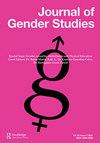Egyptian queer women’s quiet activism within repressive contexts in the Middle East
IF 1.5
3区 社会学
Q2 SOCIAL ISSUES
引用次数: 0
Abstract
ABSTRACTThis study highlights an unconventional form of LGBTQIA activism within restrictive contexts in the Middle East. Building on the triangulation of data findings obtained from activists’ social media accounts from 2014 until 2022, this study argues that Egyptian queer women mobilized quiet activism as a safe form of individual engagement within a repressive and anti-queer context fuelled by social disdain. Tracking women’s individual life stories, this study revealed an unfamiliar strategy of action that has been overlooked by scholarship addressing the LGBTQIA advocacy as a collective action in the Middle East. While scholars have entrenched the LGBTQIA advocacy within a logic of collective activism and organized cyber/groundwork, this study underlined quiet activism as a coping mechanism with state repression in order to contest the state persecution of queer citizens and violation of individual rights and freedom. Being at the intersection of individual engagement, transformative events and personal emotions, quiet activism is an adaptive form of entanglement with repressive contexts through non-confrontational and unchallenging tools of action, such as personal encounters and emotions.KEYWORDS: Queer activismindividual engagementpersonal emotionstransformative eventsEgyptthe middle east Disclosure statementNo potential conflict of interest was reported by the author(s).Notes1 This is a pseudonym given to an Egyptian trans-sexual activist for security concernsAdditional informationNotes on contributorsShaimaa MaguedShaimaa Magued is associate professor at the Faculty of Economics and Political Science, Cairo University. Her work focuses on identity politics, gender studies, mobilization and transnational advocacy, and Middle East Politics and is published in renowned peer-reviewed journals such as Current Sociology, Mediterranean Politics, Politics, and British Journal of Middle Eastern Studies. She earned her PhD in International Relations of the Middle East from SciencesPo Aix in 2012 and was awarded prestigious research fellowships, such as the Carnegie Short Term Fellowship at the University of Minnesota (2015), the Fulbright Fellowship (2018-2019), and the Ernest Mach Fellowship from OeAD in Vienna (2021-2022).埃及酷儿女性在中东压制环境下的安静行动主义
摘要本研究强调了中东地区限制性背景下LGBTQIA行动主义的一种非传统形式。基于从2014年到2022年活动家的社交媒体账户中获得的数据发现的三角测量,本研究认为,在社会蔑视的压迫和反酷儿背景下,埃及酷儿女性动员了安静的行动主义,作为一种安全的个人参与形式。通过追踪女性的个人生活故事,这项研究揭示了一种不熟悉的行动策略,这种策略被学者们忽视了,他们将LGBTQIA倡导视为中东地区的集体行动。虽然学者们将LGBTQIA的倡导置于集体行动主义和有组织的网络/基础活动的逻辑中,但本研究强调了安静的行动主义作为应对国家镇压的机制,以对抗国家对酷儿公民的迫害和对个人权利和自由的侵犯。作为个人参与、变革事件和个人情感的交叉点,安静的行动主义是一种通过非对抗性和不具挑战性的行动工具(如个人遭遇和情感)与压抑环境纠缠的适应性形式。关键词:酷儿活动个人参与个人情感变革事件埃及中东披露声明作者未报告潜在利益冲突。注1:这是一个出于安全考虑而给一位埃及变性活动人士的假名。附加信息:作者shaimaa Magued是开罗大学经济与政治科学学院的副教授。她的工作主要集中在身份政治、性别研究、动员和跨国倡导以及中东政治方面,并发表在著名的同行评审期刊上,如《当代社会学》、《地中海政治》、《政治学》和《英国中东研究杂志》。她于2012年获得science espo Aix的中东国际关系博士学位,并获得了著名的研究奖学金,如明尼苏达大学卡内基短期奖学金(2015年)、富布赖特奖学金(2018-2019年)和维也纳OeAD的欧内斯特·马赫奖学金(2021-2022年)。
本文章由计算机程序翻译,如有差异,请以英文原文为准。
求助全文
约1分钟内获得全文
求助全文
来源期刊

Journal of Gender Studies
Multiple-
CiteScore
4.40
自引率
0.00%
发文量
52
期刊介绍:
The Journal of Gender Studies is an interdisciplinary journal which publishes articles relating to gender from a feminist perspective covering a wide range of subject areas including the Social and Natural Sciences, Arts and Popular Culture. Reviews of books and details of forthcoming conferences are also included. The Journal of Gender Studies seeks articles from international sources and aims to take account of a diversity of cultural backgrounds and differences in sexual orientation. It encourages contributions which focus on the experiences of both women and men and welcomes articles, written from a feminist perspective, relating to femininity and masculinity and to the social constructions of relationships between men and women.
 求助内容:
求助内容: 应助结果提醒方式:
应助结果提醒方式:


